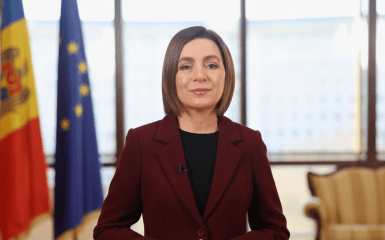Russian and pro-Kremlin agents launched an information campaign to discredit Maia Sandu's victory in the presidential elections in Moldova. In this way, they try to invalidate the voting results.
Points of attention
- The Russian Federation and pro-Kremlin agents launched an information campaign to discredit Maya Sandu's victory in Moldova.
- Agents are trying to invalidate the voting results and annul Sandu's election victory.
- There are suspicions of massive falsifications in favor of Sandu's opponent, supported by Russian oligarchs and the former president of Moldova.
- World leaders and international observers positively assessed Sandu's victory, and Russia tried to interfere in the election process.
- Attempts to interfere in the electoral process actually undermined confidence in democratic values and underscored the importance of ensuring electoral integrity.
Agents of the Russian Federation are trying to cancel the victory of Sandu in the elections
As analysts note, the Socialist Party of the Republic of Moldova called Sandu an "illegitimate president."
In addition, Moldovan oligarch Ilan Shor, who is connected to the Kremlin, told the Russian state TV channel "Russia-24" that the Moldovan opposition has "evidence" of massive falsifications in favor of Sandu.
Also, the pro-Kremlin former president of Moldova Ihor Dodon told the TASS news agency that Sandu won only thanks to the votes of the Moldovan diaspora.
The Russian information space, including Russian military bloggers, repeated the words of Moldova's pro-Russian opposition that the elections in the country are controlled by "European bureaucrats" and that citizens have no influence on their outcome.
ISW previously reported on Russia's systematic efforts to interfere in the elections in Moldova and to disrupt the referendum on the country's accession to the European Union and the victory of Maia Sandu, the report says.
Presidential elections in Moldova
On November 3, the second round of presidential elections took place in Moldova, where the main rivals were the current president Maia Sandu and the candidate from the Socialist Party, former prosecutor Oleksandr Stoyanoglo.
According to the voting results, Sandu won 55.35% of the votes and defeated the pro-Russian opponent.
World leaders congratulated Sanda on November 3 and 4, and international observers generally gave a positive assessment of the election process.
At the same time, Russia and its agents tried to interfere in the election process to influence the results.
Among the examples of such interference, councilor Sandu mentioned the organized transportation of voters from Transnistria, which is illegal according to the election code of Moldova. As of 11:00 a.m., the turnout among Transnistrian voters has already exceeded the total for the entire first round.




